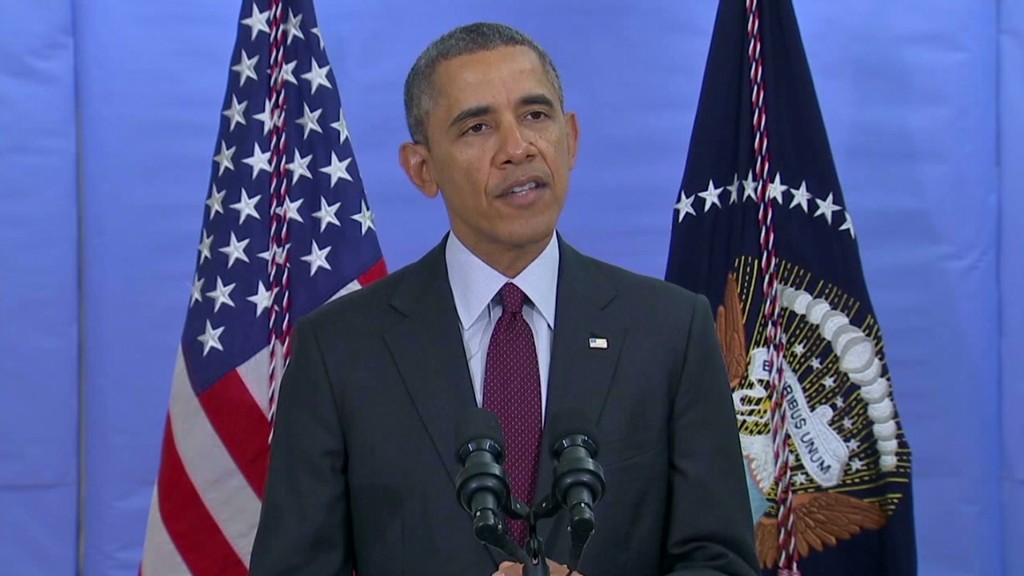
President Obama on Tuesday released a nearly $4 trillion budget proposal for 2015 that includes more generous tax breaks for working families while scaling back breaks for the rich.
His budget, while not expected to be enacted by Congress, does offer the president's fiscal policy vision for the country.
As expected, the White House says Obama's blueprint sticks to the topline spending limits already set by the House and Senate for 2015.
But the plan also features a $56 billion growth and investment package that includes money for universal pre-K, infrastructure and job training. Obama proposes to pay for those initiatives through additional spending restraint and increased revenue.
The White House Budget Office estimates that Obama's proposal overall would cut the annual deficit by 2024 to 1.6% of the size of the economy, less than half of where it's projected to be that year under current policies by the Congressional Budget Office.
Related: Tax preparer horror stories
But a key part of his budget is a series of tax changes designed to give a hand to low- and middle-income workers. To pay for those changes and to help reduce deficits, Obama, as he done repeatedly throughout his presidency, proposes to raise the tax burden on the rich. And many of his proposals are recycled from previous budgets.
Impose a "Fair Share Tax": As he has called for before, Obama wants Congress to implement the so-called Buffett Rule, which would require people making over $1 million to pay at least 30% of their income, after charitable contributions, in federal taxes.
The White House estimates the Buffett Rule could raise $53 billion over a decade and would be earmarked for deficit reduction.
Cap the value of deductions for high-income households: Obama wants to limit the value of itemized deductions, as well certain tax exclusions, to 28% of the amount claimed.
Here's how it could work: Say that someone in the 33% tax bracket saves $10,000 in his 401(k). Under current law, that contribution would effectively reduce his annual tax bill by $3,300 (33% x $10,000). Under the president's proposal, it would only do so by $2,800 (28% x $10,000).
The proposal would also affect tax exclusions for employer-sponsored health insurance and tax-exempt interest.
The Tax Policy Center estimates the proposal would hit mostly individuals who make more than $200,000 and married couples above $250,000.
This proposal is by far the largest revenue raiser in Obama's budget. The White House Budget Office estimates it could raise close to $600 billion over a decade, and like the Buffett Rule, would be intended for deficit reduction.
Limit savers' combined balance across tax-preferred accounts: The president wants to prohibit contributions to tax-advantaged retirement accounts once a person's combined balance exceeds a certain level. Such accounts include IRAs and 401(k)s.
The cap on the combined balance would be based on a saver's age and would vary over time based on factors such as inflation and interest rates. It also would be determined by what it takes to buy a "maximum benefit" annuity at age 62, with a 100% survivor benefit for one's spouse. In 2013, a maximum benefit annuity would have provided $205,000 a year.
Last year, for instance, the cap would have been $3.4 million for someone who was 62, but just $1 million for someone who was 40, according to a Tax Policy Center report.
The Employee Benefit Research Institute estimates that initially only "a very small percentage" of 401(k) participants with IRA accounts would be affected, but that number would grow over time.
The White House estimates this limitation would raise $28 billion, which would pay for half of his proposed growth and investment package.
Raise the estate tax: The president wants restore the 2009 estate tax exemption levels and estate tax rate.
The net effect: He would lower the amount of money treated as tax exempt to $3.5 million a person from more than $5 million today. And he would raise the tax rate on the taxable portion of estates to 45% from 40% currently.
The proposal is estimated to raise $118 billion over 10 years, and again would be put toward deficit reduction.
